Is Homemade Cat Food Worth the Effort? Exploring the Pros and Cons

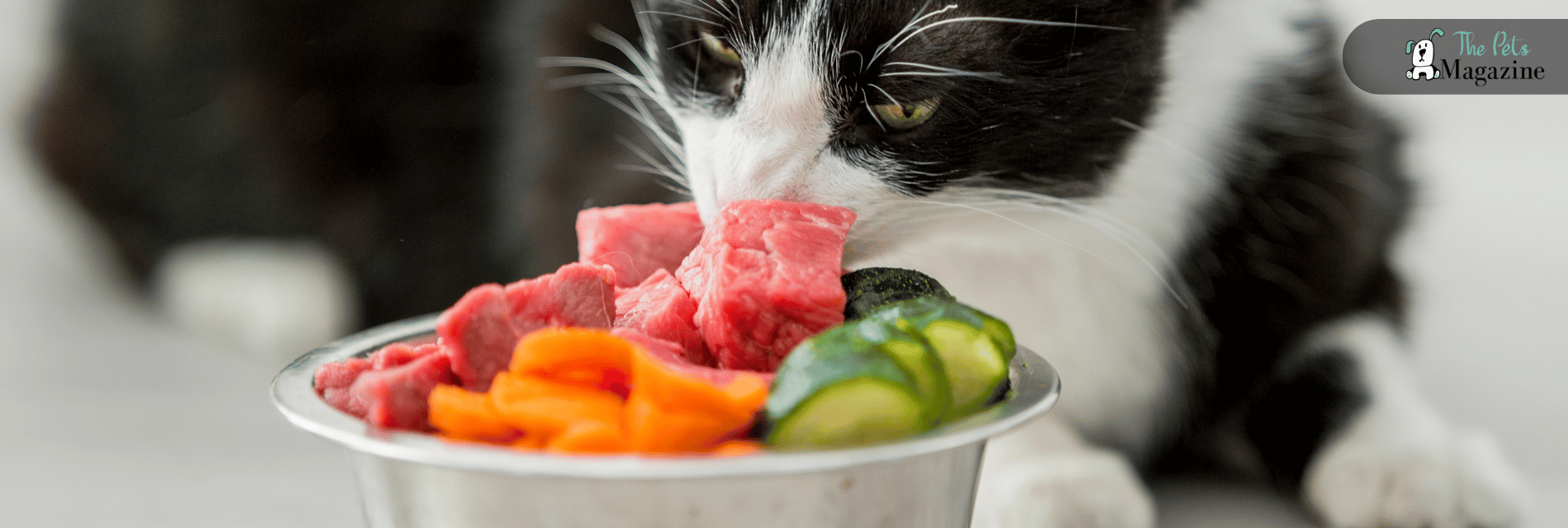
As a dedicated and affectionate pet parent, you want nothing more than the best for your cat and You are not the only one! Cat parents are exploring the idea of homemade cat food, hoping to provide their pets with the best nutrition possible. But is the extra effort of preparing homemade meals for your feline friend truly worth it?
In this article, we will explore the pros and cons of homemade cat food and help you decide if they are the purrfect fit for your cat. We will also share some recipes and talk about the factors you need to consider if you choose to treat your cat to some homemade meals. So, let’s jump in.
Pros and Cons of Homemade Cat Food
The decision to switch to homemade cat food is a big one and one that will affect both you and your pet cat. Hence, before switching, weighing the benefits and drawbacks is important. So, let’s take a closer look at the pros and cons of homemade cat food to help you make an informed choice:
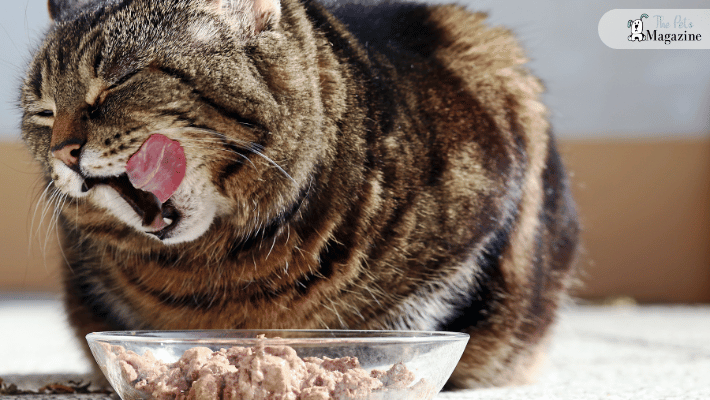
Pros of Homemade Cat Food
Here are some of the pros of making cat food at home:
Control Over Ingredients
When you prepare your cat’s meals at home, you have complete control over the ingredients. You can choose high-quality proteins and fresh vegetables and avoid any additives or preservatives that may be present in commercial cat foods.
Allows Customization
Every cat is unique, and homemade cat food allows you to tailor the recipes to your feline’s specific dietary needs. Whether your cat has food allergies, a sensitive stomach, or requires a specialized diet, you can adjust the ingredients accordingly.
For instance, if your cat is not eating much but acting normal, then it may be because they are bored of their dry kibble. With homemade cat food, you can tweak the recipes slightly or add their favorite ingredients to convince them to start eating again.
Guaranteed Freshness
Unlike commercial cat food, which may sit on shelves for extended periods, homemade meals are prepared using fresh, whole foods. This guarantees that your cat receives the maximum nutritional benefits from the ingredients.
Cost-Effective
Preparing homemade cat food can be more cost-effective than purchasing premium commercial cat food brands. But this also depends greatly on the ingredients you choose and where and how you buy them from.
Cons of Homemade cat food
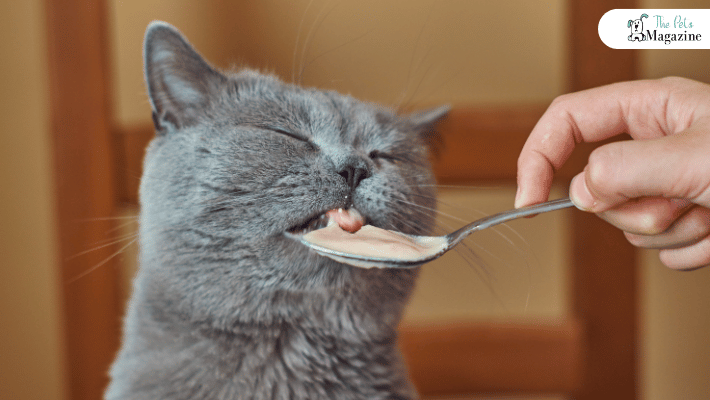
Here are some of the cons of homemade cat food:
Time and Effort
Planning meals, shopping for ingredients, preparing the food, and storing it properly can be quite time-consuming. Additionally, purchasing several high-quality ingredients to prepare homemade food for cats can prove to be more expensive than some commercially available options.
Nutritional Imbalance
Creating a balanced diet that meets all your cat’s nutritional needs can be tricky. Cats are obligate carnivores, which means they need specific amino acids and taurine that are only found in animal-based protein. This might be difficult to achieve at home without consulting a veterinarian or animal nutritionist.
Inconsistency
Maintaining consistency in the preparation and portion sizes of homemade cat food can take time, especially if you have a busy schedule or multiple cats with different dietary needs.
Food safety
Handling and storing homemade food, especially when it contains ingredients like raw meat and fish, can increase the risk of bacterial contamination for you and your cat. These ingredients may contain harmful bacteria like listeria and salmonella which can lead to various foodborne illnesses. As per WebMD, this is one of the main reasons the FDA’s Center for Veterinary Medicine and the CDC does not recommend raw cat food.
But, if you have already decided to prepare homemade food for your cat, you must follow appropriate food safety practices. This is especially crucial if you are planning on feeding your cat raw food like raw bones, organs and meat.
Nutritional Considerations for Homemade Cat Food
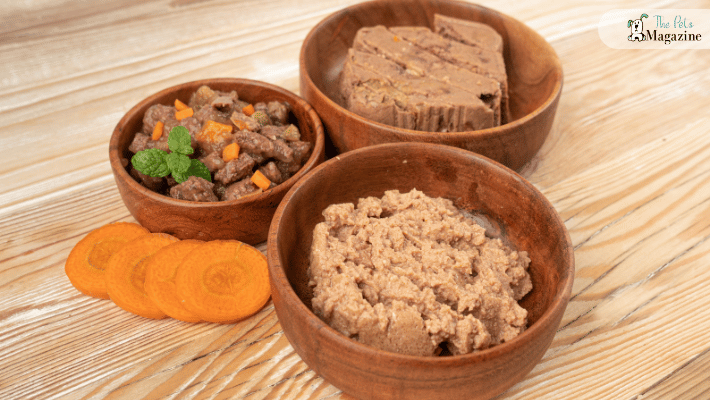
Improper formulation of homemade cat food can lead to nutritional deficiencies or imbalances, which can have serious health consequences for your cat. Hence you need to know what to put in homemade cat food to meet your cat’s nutritional needs. These are as follows:
Protein Sources: Cats are obligate carnivores, requiring a diet rich in animal-based proteins. High-quality protein sources like chicken, turkey, fish, and lean meats should be the foundation of any homemade cat food recipe.
Fats and Oils: Fats provide your cat with essential fatty acids and energy. Incorporate healthy sources like fish oil, coconut oil, or animal fats in moderation.
Vitamins and Minerals: Cats require specific vitamins and minerals, such as vitamin A, vitamin B complex, calcium, and phosphorus. Ensure your recipes include a balanced combination of these essential nutrients.
Taurine: Taurine is an amino acid crucial for cats’ heart, vision, and reproductive health. Animal-based proteins are the primary source of taurine, but supplementation may be necessary in some cases.
Also, note that cats have a low thirst drive and can easily become dehydrated. Adding moisture-rich ingredients like fish oil or warm water to their meals can help maintain proper hydration levels. If you have plain chicken broth at home, then you can also add it to your cat’s daily meals instead of water. Cats can have chicken broth on a regular basis because it improves immunity and promotes bone and joint health
How To Make Homemade Cat Food?
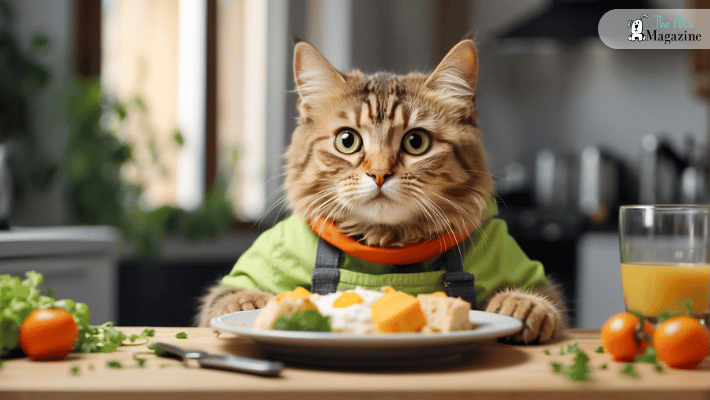
Creating a balanced diet that meets all your cat’s nutritional needs can be tricky, especially if you are doing it for the first time. According to Petmd, you should use vet-approved recipes which are formulated based on a cat’s weight, health issue, and age.
But in that case, you must ensure that your veterinarian is a board-certified veterinary nutritionist. You can also check cat weight chart available online to find out if your cat is overweight or underweight. Accordingly, you can make changes in their daily diet.
Alternatively, you can also consult the list of easy-to-make homemade cat food recipes below that are healthy and tasty. We have provided two protein options, but you can always adjust or change them based on your cat’s specific needs.
How To Make Homemade Cat Food With Chicken?
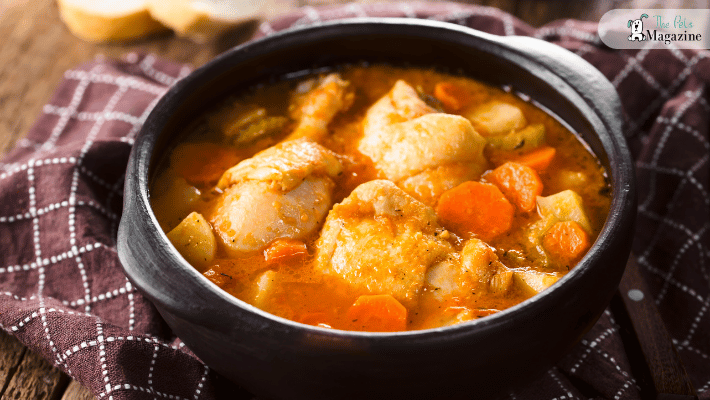
Check out the two homemade cat recipes using chicken:
Chicken and Brown Rice Recipe
Ingredients you will need:
- 1 lb boneless, skinless chicken breasts
- 1 cup cooked brown rice
- 1 egg
- 1/2 cup chopped spinach
- 1 tablespoon fish oil
- 1/4 teaspoon taurine powder (optional)
Cooking Instructions:
- Cook the chicken breasts and shred or dice into small pieces.
- In a bowl, combine the shredded chicken, cooked brown rice, egg, chopped spinach, fish oil, and taurine powder (if using).
- Mix well until all ingredients are evenly distributed.
- Portion the mixture into individual servings and store in an airtight container in the refrigerator for up to 5 days.
Chicken and Vegetable Stew
Ingredients you will need:
- 1 lb ground chicken
- 1 cup diced carrots
- 1/2 cup diced zucchini
- 1/2 cup diced sweet potato
- 1/4 cup water or low-sodium chicken broth
- 1 tablespoon coconut oil
- 1/4 teaspoon bone meal (for calcium)
Cooking Instructions:
- In a skillet, cook the ground chicken over medium heat until browned and cooked through.
- Add the diced carrots, zucchini, sweet potato, water or broth, coconut oil, and bone meal.
- Simmer for 15-20 minutes or until the vegetables are tender.
- Allow the mixture to cool slightly before portioning into individual servings and storing in an airtight container in the refrigerator for up to 5 days.
Chicken and Vegetable Purée
Ingredients you will need:
- 1 lb boneless, skinless chicken breasts
- 1 cup diced carrots
- 1/2 cup diced zucchini
- 1/2 cup water or low-sodium chicken broth
- 1 tablespoon fish oil
- 1/4 teaspoon taurine powder (optional)
Cooking Instructions:
- In a saucepan, combine the chicken breasts, diced carrots, zucchini, water or broth, fish oil, and taurine powder (if using).
- Bring the mixture to a boil, then reduce the heat and simmer for 20-25 minutes, or until the chicken is cooked through and the vegetables are tender.
- Remove from heat and let cool slightly.
- Using a blender or food processor, puree the mixture until it reaches a smooth, pâté-like consistency.
Portion the purée into individual servings and store in an airtight container in the refrigerator for up to 5 days.
How to Make Homemade Cat Food With Fish?
If your cat prefers fish, then you can consider trying out the recipes below:
Tuna and Pumpkin Delight
Ingredients you will need:
- 1 (5 oz) can tuna in water, drained
- 1/2 cup cooked quinoa
- 1/4 cup canned pumpkin puree
- 1 tablespoon fish oil
- 1/4 teaspoon taurine powder (optional)
Cooking Instructions:
- In a bowl, flake the drained tuna.
- Add the cooked quinoa, canned pumpkin puree, fish oil, and taurine powder (if using).
- Mix well until all ingredients are evenly combined.
- Portion the mixture into individual servings and store in an airtight container in the refrigerator for up to 5 days.
Salmon and Sweet Potato Bites
Ingredients you will need:
- 1 (6 oz) can boneless, skinless salmon, drained
- 1/2 cup cooked sweet potato, mashed
- 1 egg
- 1 tablespoon coconut flour
- 1 tablespoon chopped parsley (optional)
Cooking Instructions:
- Preheat your oven to 350°F (175°C).
- In a bowl, mix the drained salmon, mashed sweet potato, egg, coconut flour, and chopped parsley (if using).
- Using a spoon or small scoop, shape the mixture into tiny cat-sized balls and carefully arrange them on a parchment-lined baking sheet.
- Bake for 15-20 minutes, or until the bites are firm and slightly golden.
- Allow the bites to cool completely before serving or storing in an airtight container in the refrigerator for up to 5 days.
If your cat prefers a moist and juicy texture and you are wondering how to make homemade wet cat food, then here are two delicious recipes for you to try out.
Tuna and Pumpkin Mousse
Ingredients you will need:
- 1 (5 oz) can tuna in water, drained
- 1/2 cup canned pumpkin puree
- 1/4 cup water or low-sodium fish stock
- 1 tablespoon fish oil
- 1/4 teaspoon taurine powder (optional)
Cooking Instructions:
- In a blender or food processor, combine the drained tuna, canned pumpkin puree, water or fish stock, fish oil, and taurine powder (if using).
- Blend or process until the mixture is smooth and creamy.
- Portion the mousse into individual servings and store in an airtight container in the refrigerator for up to 5 days.
Is Homemade Cat Food Worth the Effort?
So, to sum up, there is no single answer to the question of whether homemade cat food is worth the effort. It depends on your individual circumstances, your cat’s needs, and your comfort level. In this article we have explored the potential benefits of homemade food, from increased control over ingredients to addressing specific health concerns.
We have also highlighted the challenges, including creating a balanced diet, time commitment, and food safety considerations. So ultimately, the decision rests with you. If you’re passionate about providing your cat with the best possible nutrition and are willing to invest the time and resources, homemade food might be a rewarding choice. But if you don’t, commercially prepared high-quality food or pre-made raw diets can also be excellent options.
Remember, prioritizing your cat’s health and happiness is the most important factor. So don’t forget to discuss your options with your veterinarian before making any changes to your cat’s diet.






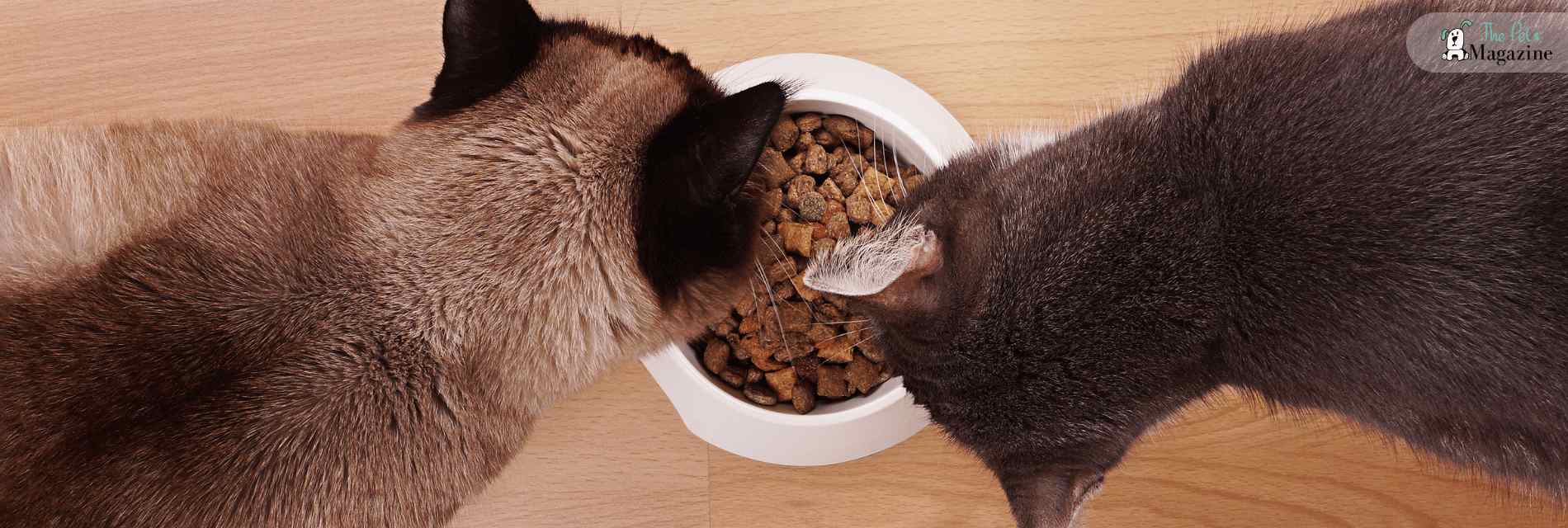

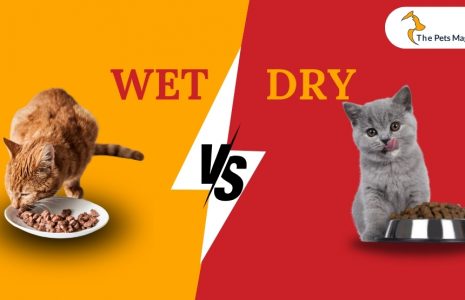
Leave A Comment